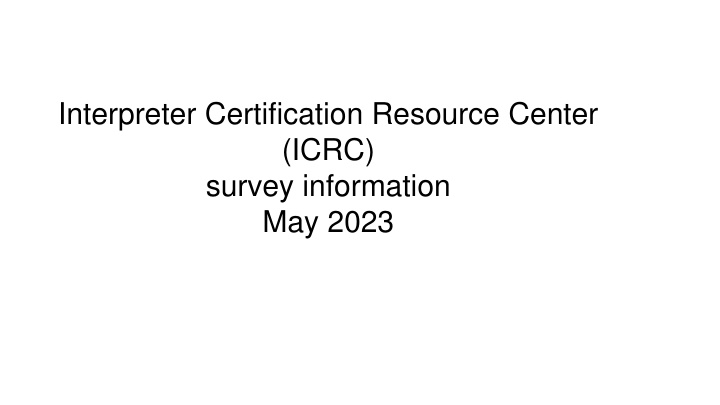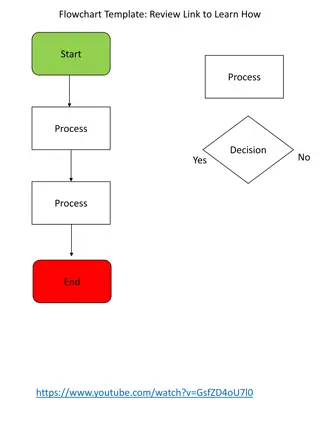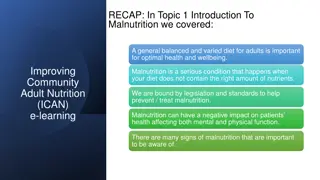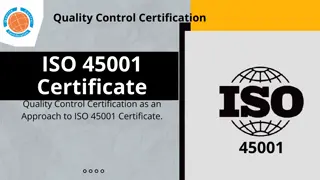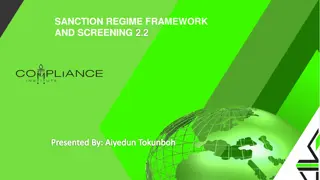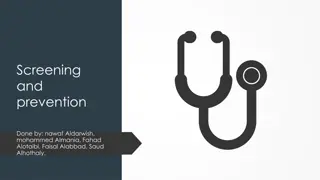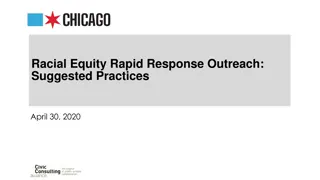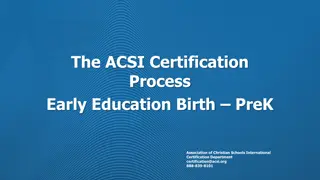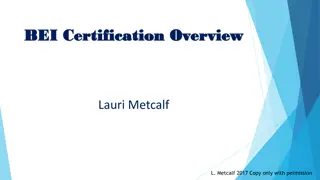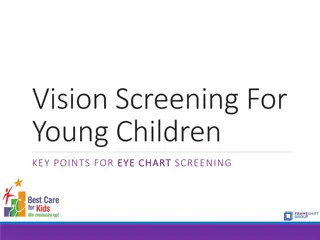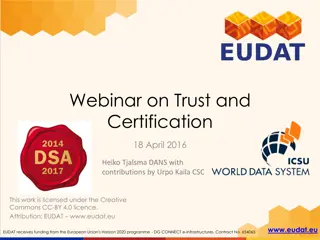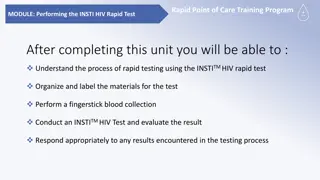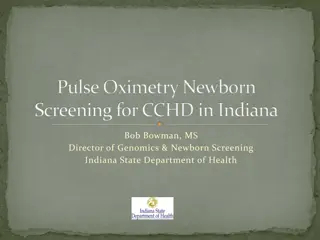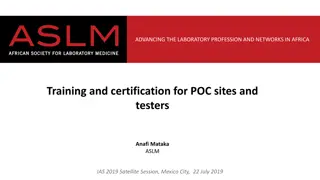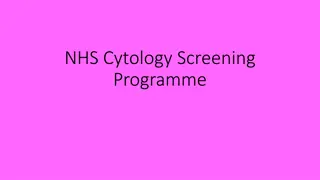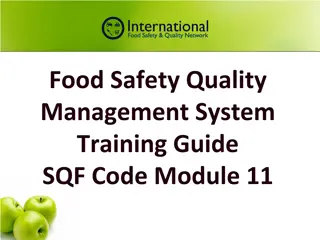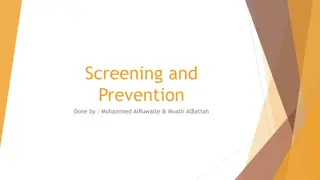ICRC Certification Resource Center - Quality Assessment Screening Test History
The history and details of the Quality Assurance Screening Test (QAST) developed by the Interpreter Certification Resource Center (ICRC) in the 1980s to assess interpreter skills and ethics. Learn about the origins, parts of the test, certification levels, and recent performance statistics for interpreters.
Download Presentation

Please find below an Image/Link to download the presentation.
The content on the website is provided AS IS for your information and personal use only. It may not be sold, licensed, or shared on other websites without obtaining consent from the author.If you encounter any issues during the download, it is possible that the publisher has removed the file from their server.
You are allowed to download the files provided on this website for personal or commercial use, subject to the condition that they are used lawfully. All files are the property of their respective owners.
The content on the website is provided AS IS for your information and personal use only. It may not be sold, licensed, or shared on other websites without obtaining consent from the author.
E N D
Presentation Transcript
Interpreter Certification Resource Center (ICRC) survey information May 2023
History of the Quality Assurance Screening Test (QAST) The Quality Assurance Screening Test (QAST) had it s beginning in the early 1980s. Many individuals who pioneered the field of interpreting saw the need for a user friendly and affordable assessment process. Gallaudet University Regional Center at Johnson County College in Overland Park, Kansas, sponsored a stakeholders meeting. Soon after the meeting, a team of professionals gathered to create the Mid-America Quality Assurance Screening Test. The team had two main objectives: To develop a certification system that would test skills and ethics of interpreters, and To establish standards at various skill levels. The finished product was shared with each state involved in the process: Arkansas, Iowa, Kansas, Missouri, Nebraska, and Oklahoma. QAST was originally administered by the organization, Oklahoma Registry Interpreter for the Deaf, until RID determined it was a conflict of interest. Then an organization, Oklahoma Interpreter Association (OIA), administered QAST until 1994 when the Department of Rehabilitation Services started administering QAST. Currently, the QAST continues successfully under the guidance of the Oklahoma Interpreter Certification Resource Center, housed in the Oklahoma Services to the Deaf and Hard of Hearing office.
Parts of QAST: Written exam 75 multiple choice questions pass with 86% Cost Oklahoma resident $50.00 Non-resident $100.00 Skill based interactive performance Cost- Oklahoma resident $125.00 Non-resident $250.00 6 ethical situations (Interview) Pre-recorded video of models signing questions Pass with 80% before level awarded Interactive 1 person (hearing) and 1 person (D/HH) meeting with each other Expressive (signing) The interpreter signs what they hear from the hearing person to the Deaf/HH person. Receptive (voicing) The interpreter voices what the Deaf/HH person is signing into English sentence for hearing person. Test for level I III Transliterating and Interpreting Level I/I Entry level beginner Level II/II Intermediate level beginner Level III/III Advance level beginner 50-69% 70%-84% 85%-100% Test for level IV-V Transliterating and Interpreting Level IV Accomplished level Level V Master level 80%-89% 90%-100%
Current ICRC certification levels Interpreting and Transliterating I/T V/V 0/V V/0 V/IV IV/V III/V IV/IV II/IV 0/IV III/III II/III II/II I/II I/I I/0 60 11 2 1 17 1 6 2 2 6 7 10 8 6 1 140 ICRC interpreters DRS Interpreter Registry | OKDRS
2019 ICRC/QAST - 93 QAST performance test administered: Interview, Transliterating (T), Interpreting (I) Written test administered 47 - 6 failed Level I-III - 63 applied for I-III 10 failed interview 1 no- level (passed interview) Level I/I T/I 2 I/0 1 0/I 10 I/I Level II/II T/I 10 II/II 21 - II/I Level III T/I 6 III/II 2 III/I Level IV-V - 30 applied for IV/IV 2 failed interview 8 no-levels (passed interview) Level IV T/I 4- IV/0 2 0/IV 7- IV/IV 1 I:IV (already had V) Level V T/I 1 V/0 1 - V/V 3 V/IV 1 I: V (already had V)
2020 ICRC/QAST - 44 QAST performance test administered (low due to COVID): Interview, Transliterating (T), Interpreting (I) Written test administered 25 all passed Level I-III - 33 applied for I-III 7 failed interview Level I/I T/I 1 - I/0 Level II/II T/I 4 II/II 14 II/I Level III/III T/I 6 III/II 1 III/III Level IV-V 11 applied for IV-V 1 failed interview 2 no level (passed interview) Level IV/IV T/I 5 IV/0 1 IV/IV Level V/V T/I 2 V/V
2021 ICRC/QAST - 80 QAST performance test administered: Interview, Transliterating (T), Interpreting (I) Written test administered 14 all passed Level I-III - 52 applied for I-III 7 - failed interview 2 no level Level I/I T/I 1 0/I 9 - I/I Level II/II T/I 2 I/II 2 II/I 18- II/II Level III/III T/I 5 III/II 6 III/III Level IV-V 28 applied for IV-V 1- failed interview 5 no level Level IV/IV T/I 5 IV/0 3 IV/IV 8 I: IV Level V/V T/I 2 V/0 1- V/IV 1 T: V 2 V/V
2022 ICRC/QAST - 73 QAST performance test administered: Interview, Transliterating (T), Interpreting (I) Written test administered 19 all passed Level I-III - 38 applied for I-III 10 - failed interview 1 no level Level I/I T/I 8 - I/I Level II/II T/I 2 I/II 5 II/I 7 - II/II Level III/III T/I 3 III/II 2 III/III Level IV-V 35 applied for IV-V 1- failed interview 5 no level Level IV/IV T/I 2 IV/0 4 IV/IV 8 I: IV 1 T:IV Level V/V T/I 1 V/0 7- V/IV 1 T: V 3 - I: V 2 V/V
The EIPA (Educational Interpreter Performance Assessment) is an evaluation tool designed and developed in 1991 by Boys Town National Research Hospital in Omaha, Nebraska. The EIPA focuses directly as an evaluation of the skills and effectiveness of K-12 educational interpreters. Educational Interpreter Performance Assessment - EIPA (boystown.org) EIPA Basic information about the EIPA The EIPA is managed by the EIPA Diagnostic Center housed at Boys Town National Research Hospital in Omaha, Nebraska. Written - $250.00 Written test 177 multiple- choice questions 1 - 3 hours to take Pass or fail pass with 75% Administered online in various test locations Performance - $350.00 Sign to English and English to sign 2 hours Has choice of: Grade level elementary or secondary Child/Teen signing mode ASL, PSE, or Manually Coded English The EIPA uses a 0 (no skills) to 5 (Advanced) Likert rating scale to indicate skill level. Could take 4-6 months (or longer) for test results Not a certification
BEI What is the BEI? The Board for Evaluation of Interpreters (BEI) certification program of the Deaf and Hard of Hearing Services (DHHS) is in charge of testing and certifying the skill level of individuals seeking to become certified interpreters in Texas. The primary goal of the BEI certification program is to ensure that prospective interpreters can comprehend, produce, and transform ASL to and from English in a meaningful and accurate manner. BEI has various specialized certifications. Board for Evaluation of Interpreters Certification Program | Texas Health and Human Services Basic information about BEI has written test and performance Has a study guide. BEI Study Guide (texas.gov) Has eligibility requirements 18 years old and high school diploma or equivalent No criminal conviction Associate degree from an accredited college or university, or at least 60 credit hours with a cumulative GPA of 2.0 Test of English Proficiency (TEP) $95.00 or higher if proctor charges a fee Timed test 75 minutes Grade level of the TEP is 11th to 12th grade 30 days or longer for result 80 items on the test multiple-choice Reading Comprehension, Synonyms, Grammar and Usage, Sentence Completion, and Antonyms Must answer 55 questions correctly to receive passing score Continued on next slide
Performance - Basic, Advance, and Master certifications (fees are non-refundable) Basic - $145.00 The content of the Basic test focuses primarily on the language found in routine educational and social service settings. Examples of possible topics include K 12 classroom presentations by students or teachers, special school assemblies, homework assignments, school memos, informational meetings or orientations, and so on. expressive interpreting (spoken English-to-ASL), expressive transliterating (spoken English-to-signed English), receptive (ASL-to-spoken English), and sight translation (written English-to-ASL). Advanced - $175.00 The content of the Advanced Test focuses primarily on the language found in a variety of high-stakes settings, such as routine medical, social service, K 12 and higher education, routine mental health, and routine quasi- legal. Examples of possible topics include postsecondary student and professor classroom presentations, professional development seminars, doctor or dentist visits, application for services, employment forms, counseling sessions, and so on. expressive interpreting (spoken English-to-ASL), expressive transliterating (spoken English-to-signed English), receptive interpreting (ASL-to-spoken English), receptive transliterating (signed English-to- spoken English), and sight translation (written English-to-ASL). Master - $195.00 The content of the Master test focuses on the language found in a variety of complex high-stakes settings, such as medical, mental health, quasi-legal, and educational settings. Examples of possible topics include patient information forms, intake forms, contracts or contract negotiations, meetings with medical specialists, special education meetings, and so on. expressive interpreting (spoken English-to-ASL), expressive transliterating (spoken English-to-signed English), receptive interpreting (ASL-to-spoken English), receptive transliterating (signed English-to- spoken English), and sight translation (written English-to-ASL).
Test for individuals that are Deaf/Hard of Hearing Proficiency Test for the D/HH Cost $75.00 Performance test for the D/HH Cost $75.00 Information is per the Texas Administrative Code 5/5/23
NAD/RID is a national membership organization CASLI, LLC, operates separately from RID, with their own Board of Managers and testing committee, however, RID remains CASLI s sole owner and shareholder and CASLI remains RID s sole testing entity that administers national ASL-English interpreter certification exams. Center for Assessment of Sign Language Interpreters (casli.org) Basic information Has eligibility requirements Exam Preparations Center for Assessment of Sign Language Interpreters (casli.org) Must pass CASLI Generalist Knowledge exam before eligible for NIC Interview and Performance exam. Cost member $350.00 non- $450.00 Computer exam with 150 multiple- choice questions Score of 500 or better to pass 1 point for each correct answer (score range 200 800). Due to COVID the CASLI Generalist Performance Exam Once completed, the NIC Interview and Performance Exam will be retired. GAP test for hearing interpreters
The NIC Interview and Performance is a pass or fail no levels NIC Interview and Performance Scoring Center for Assessment of Sign Language Interpreters (casli.org) Hearing NIC Interview Cost member $450 non- $500.00 Ability to assess testers ability to evaluate ethics situations and apply the Code of Professional Conduct (CPC) Performance Interactive (expressive and receptive)
The NIC Interview and Performance is a pass or fail no levels NIC Interview and Performance Scoring Center for Assessment of Sign Language Interpreters (casli.org) Hearing NIC Interview Cost member $450 non- $500.00 Ability to assess testers ability to evaluate ethics situations and apply the Code of Professional Conduct (CPC) Performance Interactive (expressive and receptive) Deaf/HH (CDI) For CDI Candidates Center for Assessment of Sign Language Interpreters (casli.org) CASLI Generalist Knowledge Exam 120 multiple-choice questions CASLI Generalist Performance Exam Tester will interpret scenarios that use common vocabulary and may include consecutive or simultaneous interpreting to and from ASL to a specialized sign language system or English; the scenarios involve common community-based interpreting assignments.
Survey LIVE Survey LINK: https://www.surveymonkey.com/r/OkICRC or QR code (QR/barcode app required)
